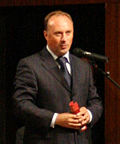| Vice President of the Government of Croatia | |
|---|---|
| Potpredsjednik Vlade Republike Hrvatske | |
 | |
Incumbent since 17 May 2024, 17 January 2023, 19 July 2019, 15 July 2022, 23 July 2020, 17 May 2024 and 11 February 2025Ivan Anušić, Branko Bačić, Davor Božinović, Oleg Butković, Tomo Medved, Marko Primorac and David Vlajčić | |
| Appointer | Prime Minister of Croatia |
| Term length | At the pleasure of the Prime Minister and the parliamentary majority |
| Inaugural holder | Bernardo Jurlina, Mate Babić and Milan Ramljak |
| Formation | 31 May 1990 |
| Website | www |
 |
|---|
The deputy prime minister of Croatia (officially the Vice President of the Government of the Republic of Croatia, Croatian : Potpredsjednik Vlade Republike Hrvatske) is the official deputy of the Prime Minister of Croatia. Article 109 of the Constitution of Croatia states that the cabinet is to be made up of the Prime Minister, one or more deputy prime ministers and other cabinet ministers. According to convention, if the governing parliamentary majority is a coalition of parties, all junior partners in the coalition will usually be given one deputy prime minister in the cabinet, with their rank usually being determined by the number of MPs the party has in Parliament. The deputy prime ministers are permitted to simultaneously hold a ministerial portfolio while in office, but may also serve without holding such a portfolio.
Contents
- History of the office
- List of deputy prime ministers
- Cabinet of Stjepan Mesić (1990)
- Cabinet of Josip Manolić (1990–1991)
- Cabinet of Franjo Gregurić (1991–1992)
- Cabinet of Hrvoje Šarinić (1992–1993)
- Cabinet of Nikica Valentić (1993–1995)
- Cabinet of Zlatko Mateša (1995–2000)
- First and Second cabinet of Ivica Račan (2000–2003)
- First and Second cabinet of Ivo Sanader (2003–2009)
- Cabinet of Jadranka Kosor (2009–2011)
- Cabinet of Zoran Milanović (2011–2016)
- Cabinet of Tihomir Orešković (2016)
- First, second and third cabinet of Andrej Plenković (2016–present)
- See also
- References
The Deputy Prime Minister of Croatia is not the constitutional successor of the Prime Minister and will not automatically assume the post of Prime Minister in the event of a vacancy. However, the Deputy Prime Minister may chair cabinet meetings in the event of the Prime Minister becoming temporarily incapacitated or otherwise unable to chair the meetings of his or her government cabinet.




































